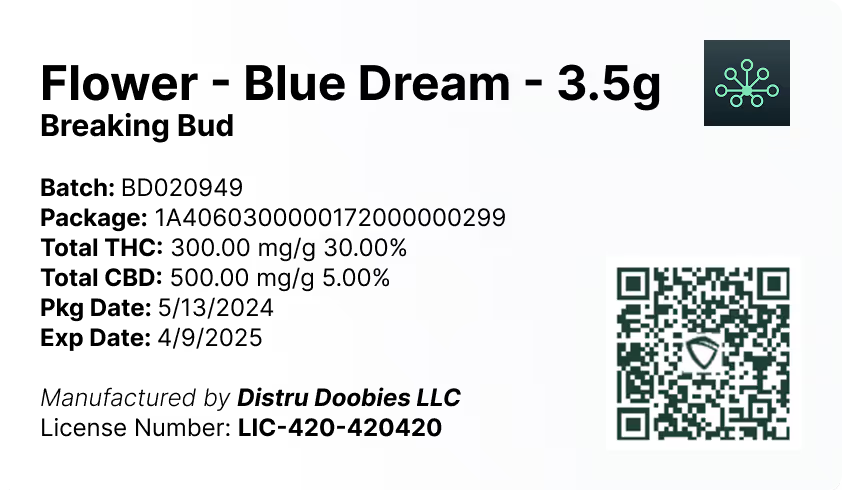Cannabis laws in Connecticut have undergone a massive transformation. It all started with decriminalization back in 2011, which then evolved into a solid medical program by 2012. And after a decade-long push, the legal adult-use market finally arrived in 2021.
But even with these big changes, getting into the cannabis business isn't exactly a walk in the park. Regulations are quite complex and have a lot of different aspects that you should be familiar with.
.avif)
For all operators, from cultivators and processors to distributors and retailers, understanding every detail is the secret to success and staying out of trouble.
We get it—this may sound overwhelming. Fortunately, the following guide is here to change that. We'll break down what you should know for robust compliance and explain how a powerful cannabis inventory management solution like Distru can be your anchor in this shifting environment.
Ready to demystify the rules? Let's keep going.
Introduction to Connecticut Cannabis Laws
.avif)
Let's rewind the tape. Back in June 2011, Governor Dan Malloy decriminalized cannabis possession, but its use wasn't legalized at the time. The state only decided that a minor cannabis offense shouldn't derail a person's life with a criminal record.
But the very next year, Governor Malloy signed the medical marijuana program into law, allowing patients with debilitating conditions to access and use cannabis.
Recreational legalization took a bit longer. A bill was drafted in 2018, but it stalled. Proposals came and went. In March 2020, a promising bill with real support was suddenly sidelined by the COVID-19 pandemic shutdown.
Persistence paid off in 2021. On June 22, Governor Ned Lamont signed Senate Bill 1201, making recreational cannabis legal for adults aged 21 and over, starting July 1.
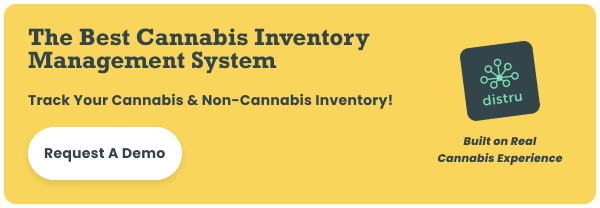
The first adult-use sales finally kicked off in January 2023, and the law also set in motion the automatic clearing of thousands of low-level cannabis records.
So, why does this history lesson matter for you as an operator? Because while these laws permit possession, use, and cultivation, there are strict limits. For example, you can only carry and grow a certain amount of cannabis, and outdoor cultivation is a felony in this state! That's why it's essential to get a grasp on these regulations.
Let's break down these nuances, from possession caps and sales rules to cultivation do's and don'ts and the compliance requirements that will keep your business on the right side of the law.
.png)
Key Regulatory Bodies and Compliance Framework
Who's actually in charge of enforcing all cannabis laws in Connecticut? And how do you, as a business owner, keep track of everything without losing your mind? Let's take a look.

Who Governs Cannabis in Connecticut?
The entire Connecticut cannabis market, both medical and recreational, is overseen by one agency: the Department of Consumer Protection (DCP).
This body is like the principal of the school. Its job is to make sure every single part of the cannabis supply chain—from a seed being planted to a product being sold—follows state law.
The DCP creates the rules for a safe, legal, and responsible market and is the authority you'll be answering to.
Track-and-Trace and Compliance Systems in Connecticut
Connecticut keeps an eye on every cannabis plant and product through a mandatory seed-to-sale tracking system called BioTrack, which is referred to as the Cannabis Analytic Tracking System (CATS) statewide.
If you run a licensed business, you must use BioTrack to report your operations and ensure every cannabis product is tracked from "seed to sale."
Manually logging this data can be a nightmare, but don't panic. You can also use a third-party software like Distru that integrates directly with the system to automate the process.
.avif)
Distru automatically syncs with the state-mandated platform and updates your information on both sides. Our solution eliminates the need for manual entry, which saves you countless hours and drastically reduces the risk of human error, streamlining BioTrack compliance in Connecticut.
Legal Status of Cannabis in Connecticut
Now, you might be asking, "What are the current cannabis laws in Connecticut?" To sum up, it's legal for both medical and recreational use, but under two distinct sets of rules. We'll dive into the details below.
Medical vs. Recreational Cannabis Laws
There's a clear line between the rules for medical and recreational cannabis. Here's a breakdown of what you need to know:
For Medical Use:
Connecticut's medical program was built from the Public Act 12-55 (2012), An Act Concerning the Palliative Use of Marijuana, which allowed registered patients with certain health conditions to use cannabis.

This program is still running strong today, managed by the DCP to ensure a safe supply for those who need it most.
Some of the most important medical marijuana laws in CT include:
- What's Allowed?: You can use medical marijuana for specific debilitating health conditions, such as cancer, glaucoma, multiple sclerosis, and PTSD. However, it's illegal to do so in public places, including on school grounds, in the workplace, or while in a moving motor vehicle.
- Who Qualifies?: You may be able to buy medical cannabis if you have a qualifying condition, as long as you're properly diagnosed and certified by a Connecticut-licensed physician.
- Are Purchases Taxed?: You have to pay the state sales tax of 6.35% but are exempt from municipal sales and THC potency-based taxes when you purchase medical cannabis in Connecticut.
- What About Product Access?: You'll find a wider range of medical marijuana products and different potencies that aren't always available on the recreational side.
- Can a Caregiver Help?: As a qualifying patient, you can designate a primary caregiver to assist you, who must also register with the state.
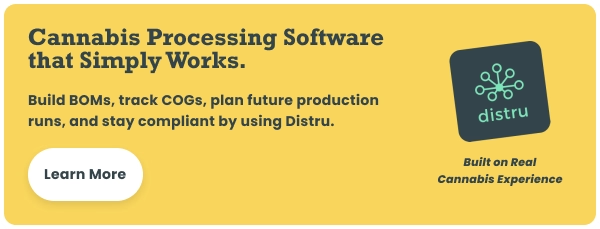
For Recreational Use:
The adult-use market operates under a different law: the Public Act 21-1 (2021), also known as the Responsible and Equitable Regulation of Adult-Use Cannabis Act (RERACA).
This act legalized cannabis for all adults 21 and over and created the licensing framework for the market we see today.
.png)
Some of the main recreational marijuana laws in CT include:
- What's Allowed?: Recreational cannabis is legal, but you can't use it while driving or in public places where you can't smoke tobacco or where minors are present, such as school grounds, work environments, state parks, and on beaches. Individual towns may have their own policies.
- Who Qualifies?: You don't need registration or medical certification to purchase recreational cannabis, but you must comply with age requirements and possession limits.
- Are Purchases Taxed? When purchasing recreational cannabis in Connecticut, you have to pay the state sales tax (6.35%), a municipal tax (3%), and a potency-based excise tax (10–15% depending on the product's THC content).
- Are There Potency Limits?: As of October 1, 2025, you'll see a change in potency caps: the limit for raw flower is being raised to 35% THC, and the cap for concentrates (excluding vapes) is increasing to 70%.
- What About Social Equity?: You may be eligible for support and broader licensing opportunities if you are from a community disproportionately impacted by past drug policies.
Keep in mind that this is a market that's still maturing, as you'll see from the new legislation passed in 2025. Public Act 25-166, officially titled "An Act Concerning the Regulation of Tobacco, Cannabis, Hemp and Related Products, Conduct and Establishments," further refined the rules on everything from product potency to how you run your business.
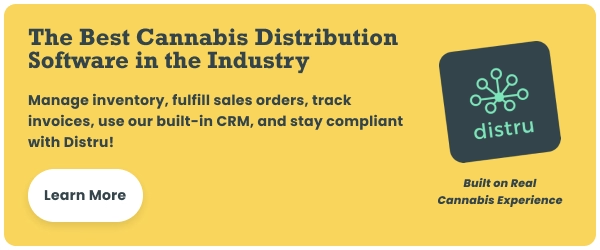
Who Can Possess and Purchase Cannabis?
Getting into the specifics, who can actually walk into a dispensary or have cannabis on them? The rules differ depending on whether you're part of the medical program or are a recreational user.
For medical cannabis, you must be at least 18, have a proper diagnosis of a qualifying condition from a registered physician, and be a state resident. If you're a minor, you can also participate with your parent or guardian acting as your caregiver.
For recreational use, the rule is simpler: you must be 21 or older.
And how much cannabis can you legally possess in Connecticut? The answer also depends on which category you fall under.
These are the cannabis possession limits in CT:
- For medical use, you and your caregiver can possess up to 5 oz of cannabis.
- For recreational use, the limit varies as follows:
- In Public: You can carry up to 1.5 oz of cannabis flower or its equivalent on your person.
- In a Car: You can have up to 5 oz in a locked glove compartment or the trunk of your vehicle.
- At Home: You can store up to 5 oz in a secure, locked container at your private residence.
Okay, but where do you get it? Only at properly licensed Connecticut cannabis dispensaries. Here's what you need to know:
- You can purchase medical cannabis from a state-licensed dispensary or a hybrid retailer (which serves both markets). There's no limit on the size of single transactions, but you can buy a maximum of 5 oz of flower per month.
- You can get recreational cannabis exclusively at licensed retailers or hybrid shops, with a purchase limit of up to a half-ounce of flower or the equivalent in other forms (such as up to 14 one-gram pre-rolls or 8 one-milliliter vape cartridges) per transaction.
.avif)
Operating a Cannabis Business in Connecticut
Want to look at what it takes to run one of those dispensaries? Cannabis laws in Connecticut don't apply just to consumers. If you want to enter the business, these regulations form the entire rulebook for your operation, dictating everything from how you get your license to how you track your inventory and report to the state. We'll go over this below.

Licensing Types and Application Requirements
The DCP issues a wide array of licenses for cannabis businesses. Here are some of the main types you'll find:
- Cultivator and Micro-cultivator: For growing operations, with micro-cultivators operating on a smaller scale.
- Producer: Specifically for growing medical-use cannabis.
- Product Manufacturer and Food/Beverage Manufacturer: For extracting, creating, and infusing both medical and recreational cannabis products.
- Dispensary Facility: For selling medical cannabis only.
- Retailer and Hybrid Retailer: For selling directly to consumers. Hybrid retailers are existing medical dispensaries that also sell adult-use cannabis.
- Transporter and Delivery Service: For moving product between businesses (transporter) or from a retailer to a consumer's door (delivery service).
- Testing laboratory: For ensuring product safety and potency.
As for the application process, Connecticut uses a lottery system to award a limited number of licenses.
But winning that lottery is just the first step. You'll need to submit a comprehensive cannabis business plan (should include a section focusing on CT BioTrack compliance), pass rigorous background checks, secure local zoning approval, and pay the required fees, which can range from as low as $100 for lottery entry and $250 for provisional licensees to as much as $75,000 for final licenses and $3 million for certain license conversions.
Note: If you're an approved social equity applicant, you may qualify for a 50% reduction in both application and annual license fees.
.avif)
Inventory Management and Recordkeeping
Once you're operational, you must track every gram of cannabis in real-time, reconcile your inventory regularly, and generate detailed reports.
Accurate inventory tracking and meticulous recordkeeping are your first and best defense against regulatory violations. That's why you need a robust cannabis compliance software.
We've built Distru to simplify both things. Our solution automates inventory and cost tracking, seamlessly generates compliance reports, and saves you from the nightmare of using manual spreadsheets, reducing the risk of costly errors.
Seed-to-Sale Tracking and BioTrack Integration
As mandated by the DCP, you need to use Connecticut's BioTrack system (CATS) to monitor a product's journey from seed to sale and ensure that every gram of cannabis is accounted for, from the moment it's a tiny plant to the moment it's sold to a customer.
But you can't always escape errors if you do your tracking and reporting manually. That's why you need a solution that can integrate with BioTrack, and this is where Distru comes in.
With our cannabis ERP, you can detect and address issues that can quickly become costly violations. Plus, Distru's live integrations and workflow tools ensure every movement is automatically recorded and reported, so you're always audit-ready throughout every phase of your operation.
.avif)
Cultivation, Processing, and Distribution Regulations
Thinking about growing your own cannabis in Connecticut? The rules for growing cannabis at home are completely different from those for running a business. And if you're launching a commercial operation, the real work begins after you get your license. How do you actually manufacture products and get them to market? Let's dive in.
Growing Cannabis in Connecticut
First things first, can you grow your own cannabis plants in Connecticut? The answer is yes, for both medical patients and adults, but this is subject to strict limitations.
You can grow up to 3 mature and 3 immature plants at your primary residence, with a maximum cap of 12 plants per household, regardless of the number of adults residing there.
When growing cannabis in Connecticut, you should also keep your plants indoors, secure (only the person who is legally growing the plants can access them), and out of view from the public (plants shouldn't be visible from the street). Outdoor cultivation for any purpose remains completely illegal.
However, commercial cultivation operates on a completely different level. First of all, you need a state license, which comes with several obligations. For example, you can only operate in a facility with a grow space that is at least between 2,000 and 10,000 sq. ft if you're a micro-cultivator or 15,000 sq. ft if you're a full-scale cultivator.
Moreover, you must comply with local zoning requirements. This means you need to get municipal approval, avoid sensitive locations, and respect the density limits (the number of cannabis establishments permitted in certain areas).
Your facility must also have mandatory security features like video surveillance and controlled access to prevent unauthorized entry and theft. And you're also required to comply with regulations for plant labeling and packaging, contribute to the Social Equity fund, and use the state's track-and-trace system.
Finally, as of 2026, you may be allowed to operate a cultivation facility outside Disproportionately Impacted Areas (DIAs) if you meet certain conditions. However, all related manufacturing activities, such as drying, must be conducted within them.

Manufacturing and Edibles Regulations
If you hold a product manufacturer license, you're authorized to perform various activities, including cannabis extractions and infusion, to create cannabis products that you can then sell or transfer to other licensed facilities.
The state's adult-use market is home to a wide variety of products, from the common flowers and concentrates to the increasingly popular infused goods like gummies and beverages. But are cannabis edibles legal in Connecticut? Yes, they are!
To ensure the legality of cannabis edibles in CT, must adhere to a strict set of regulations, including:
- All edibles must be tested by an independent lab for potency, contaminants, and purity.
- A single serving cannot exceed 5mg of THC, and a single package cannot contain more than 100mg total.
- Edibles must be in child-resistant, resealable, and all-white packaging that cannot appeal to individuals under 21.
- Products can only be in cuboid or spherical forms and cannot be shaped like animals, people, fruit, or other shapes that may appeal to children.
- Capsules, pills, and suppositories are only allowed in the medical program.
- Labels must include specific, red-boxed warning statements, THC content, and a universal symbol.
- Cannabis beverages must be packaged in single-serving sizes.
Distribution and Retail Guidelines
Once the products are all set to go, how do you get them out there? Your license type provides the answer.
If you're a transporter, you're like a cannabis FedEx and can move inventory exclusively between licensed businesses— from cultivators to processors or from manufacturers to retail dispensaries. If you operate a delivery service, you're like the Uber Eats of Weed and can transport products from retailers directly to consumers.

Each has its own set of requirements, but in both cases, you must use secure, locked vehicles with GPS, maintain detailed chain-of-custody logs for every single package, and store everything in secure, access-controlled facilities. Therefore, your operation must run on flawless cannabis distribution management.
If you're a retailer or a hybrid retailer, the rules are also extensive. You must:
- Verify the age (21+) and identity of every single customer with a photo ID.
- Enforce purchase limits (half an ounce of flower or its equivalent per transaction).
- Report every transaction to the state's tracking system in near real-time.
- Operate in compliance with local zoning, which can limit the number of retailers per municipality.
- Follow stringent security protocols for both the premises and during the movement of products.
Penalties for Violating Cannabis Laws in Connecticut
You've now got a solid grasp of the rules. But what happens if someone breaks them? What are the penalties for violating cannabis laws in Connecticut? The consequences can be serious and apply to both consumers and business owners.
Here's a quick look at some potential cannabis penalties in CT:
For Consumers:
- Possession of Over 1.5 oz in Public (21+): Misdemeanor, punishable by up to 1 year in jail and a $2,000 fine.
- Possession of Over 5 oz at Home or in a Locked Container (21+): Civil fine up to $500 for first offenses. Misdemeanors with possible jail time (1 year) and a $2000 fine for repeat violations.
- Home Cultivation Above the Legal Limit: Written warning for first offenses. Civil offense and $500 fine for second violations. Misdemeanor with up to 30 days in jail and $500 fine for subsequent offenses.
- Possession with Intent to Distribute: Felony. Up to 7 years in prison and a $25,000 fine for less than 1 kilogram, and 5 to 20 years for 1 kilogram or more (first offenses). Up to 15 years in jail for less than 1 kilogram and 10 to 25 years for 1 kilogram or more, along with increased fines of up to $100,000 (subsequent offenses).
- Selling Near Protected Locations: 3 additional years of imprisonment, added to the base sentence.
- Possessing Marijuana Paraphernalia: Civil infraction, with a 60-day license suspension for amounts under half an ounce. Misdemeanor, punishable by three months in prison and a $500 fine for larger quantities. Enhanced penalties, including an additional year in jail and a $2,000 fine, for possession with intent to distribute or within 1,500 feet of a school.
- Driving Under the Influence (DUI) of Marijuana: Misdemeanor, punishable by penalties similar to an alcohol DUI, including fines of up to $1000 and required substance abuse treatment for first-time offenders.
- Minors (Under 21) Caught with Cannabis: Fines starting at $50 and a 60-day driver's license suspension for ages 18-20. A written warning or referral to youth services for those under 18.

For Business Owners:
- Operating Without a License: Civil penalty of up to $30,000 per violation, per day, and potential criminal charges.
- Unlicensed Cultivation or Distribution: Fines of up to $25,000 and prison time of up to 7 years for first offenses. More severe penalties, including up $100,000 in fines, property forfeiture, and up to 25 years in jail, for more serious and subsequent violations.
- Selling or Distributing to Minors (-18): 2 years of mandatory imprisonment added to any other sentence.
- Violations Occurring Within 1,500 of Protected Areas: 3 years of mandatory imprisonment added to any other sentence.
- Failure to Display Required Licensing QR Codes Publicly: Fines of up to $5,000 per violation and potential license suspension, revocation, and refusal by the DCP. Higher penalties and civil judgments for willful violation of the Connecticut Unfair Trade Practices Act (CUTPA).
- Violating Security, Labeling, Packaging, or Advertising Regulations: Administrative fines of up to $5,000 per violation and potential license suspension, revocation, and refusal by the DCP. More severe penalties and civil judgments under CUTPA.
The Future of Connecticut Cannabis
What does the future hold for the state? Where are cannabis laws in Connecticut headed next? Let's take a look at what to expect in the coming years, from new business opportunities to evolving technology.
Market Growth and Business Opportunities
The Connecticut cannabis market is experiencing robust growth, with combined medical and adult-use sales surpassing $191 million so far in 2025. Two main factors are fueling this expansion: rising consumer demand and a huge increase in retail dispensaries—the number has tripled in only two years since adult-use sales started.
A limited number of producers is creating a supply bottleneck and leading to higher prices. However, this shortage also presents a major opportunity for new cultivators and manufacturers to enter the market. To bridge the gap, Connecticut is expanding its licensing options and running support programs, including social equity provisions designed to ensure applicants from communities disproportionately impacted by past policies have a fair chance to get their foot in the industry.
Technology is also helping both new licensees and existing operators leverage these opportunities. Having a solid cannabis tech stack does far more than just help businesses fulfill the state's seed-to-sale tracking mandate. Modern ERP solutions with comprehensive tracking tools and powerful integrations are a game-changer for inventory management, operational efficiency, and compliance. These innovations can also streamline your supply chain from day one, allowing you to compete and scale more effectively.
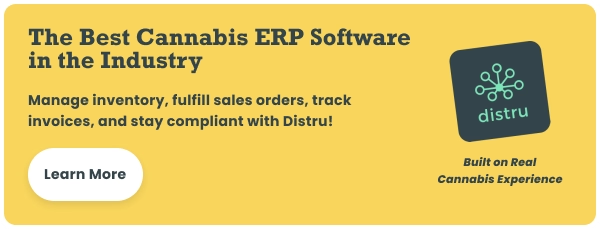
Staying Ahead with Distru
Feeling overwhelmed by the intricacies of compliance, inventory, and reporting? You're not alone.
We know that cannabis laws in Connecticut are complex, and keeping up with them can feel like a full-time job. But what if you didn't have to? Comprehensive software like Distru can help you make compliance and operations easier.
We built Distru to take the tedious work of cannabis compliance off your hands. Our solution provides real-time tracking, ensuring every transaction is logged and every gram is accounted for, and gives you a unified view of your entire stock from seed to sale. Moreover, it seamlessly integrates with BioTrack to automate reporting, eliminate manual errors, and free up your team to focus on growth instead of paperwork.
Ready to see how Distru can simplify your operations and provide the confidence you need to thrive in this highly regulated market? Schedule a demo today and discover how we can help you stay on the right side of the law!



